WorldFish Center
The WorldFish Center in Penang, Malaysia, has hosted four high school interns since 2002.
Established in 1977, the WorldFish Center is an international research organization working to eradicate hunger and poverty through research and development to enable small scale fisheries to be more resilient and productive, and to support the adoption 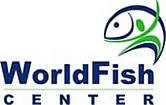 of sustainable aquaculture that specifically benefits the poor.
of sustainable aquaculture that specifically benefits the poor.
The WorldFish Center carries out research and development in policy, economics and social sciences; natural resource management; aquaculture; and genetic improvement.
Headquartered in Penang, Malaysia, the WorldFish Center has research centers in eight countries in Asia, Africa, and the Pacific.
Interns at WorldFish Center work alongside renowned international researchers and experts - like the Dr. Meryl Williams, and Dr. Ilona Stobutzki - in the field at Redang Island and the WorldFish Center's research labs in Penang.
The students also had the opportunity to travel around Malaysia with their host families and colleagues to see the Batu Ferringhi night markets, Penang Times Square, Kek Lok Si Temple, Gurney Plaza, Dragon Boat Festival, and Penang Hill.
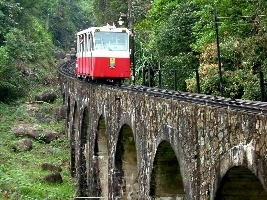
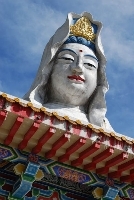
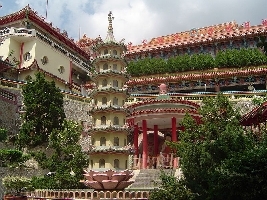
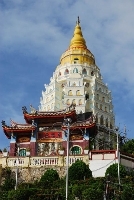
Images licensed by CC-BY-SA and GFDL (courtesy: )
Malaysia Specific Questions
Suggested Travel Link: https://travel.state.gov/content/travel/en/international-travel/International-Travel-Country-Information-Pages/Malaysia.html
Visa required: Visa Required if staying longer than 90 days.
Passport: Required
Travelers Heath & Vaccinations: Visit the CDC website at https://wwwnc.cdc.gov/travel/destinations/list
Embassies & Consulates Contact:
-
U.S. Embassy Kuala Lumpur - 376 Jalan tun Razak 50400, Kuala Lumpur Malaysia
Telephone: +(60)(3) 2168-5000
Emergency: +(60)(3) 2168-5000 (press 1 at the recording)
Geography: Refer back to "International Internship Sites"
Cellular apps (highly suggested to download prior to departure): US Embassy. Airlines the intern will be traveling through. Whatsapp
COMMON QUESTIONS ASKED OF THE HOST CENTERS
BY THE WORLD FOOD PRIZE INTERNATIONAL SUMMER INTERNS
Who will pick me up at the airport? Where exactly should I meet this person? Who would I contact and at what phone number if my flight is behind schedule and extremely late in arriving?
One of our regular taxi contacts will be there with a sign to pick the intern up.
What is the weather usually like during the period June through August?
The weather is pretty hot and humid most of the time, with rain off and on (but warm rain, not cold rain). Throughout the year, the temperature ranges from 77F to 95F. Outdoors is rather humid, but most buildings/offices are air-conditioned and can be quite cool (the thermostats are usually set between 64F-74F). So bring some kind of jacket for inside the office, as it can be a bit cold.
Here are some sites you might find useful about Penang. Penang is a popular tourist spot, so if you google it you’ll find lots more:
- Know-before-you-go-to-penang
- http://www.tourismpenang.net.my/
- https://www.timeout.com/penang/50-things-to-do
Describe the range of attire required during the internship:
Is the dress code business or casual?
Business casual. No need to wear a suit, but do dress smart. Once you’ve been here for a bit then jeans would be OK for Fridays. Open toes shoes are fine. Bring a pair of flip flops or crocs that you can wear around outside the office.
Outside the center, Penang is quite multicultural, which includes a range of clothing including quite modest (not many burkas, but MANY headscarves) to quite liberal (strappy tank tops and shorter skirts). We would recommend to err on the slightly more conservative side at least to start with cotton pants and cotton shirts. This also comes in handy for going onto very air-conditioned places. Sandals are pretty standard here, but there are plenty of people who wear sneakers or other shoes. Our recommendation would be to wear things that are comfortable. You can always buy clothes here, but we usually recommend people bring shoes as I find the ones here to not be as sturdy.
General description of accommodations:
Dorm-style housing? Home-hosting with a family?
The intern will likely be hosted with a couple of different folks, some couples, some families; all will likely be in apartments (BTW- most apartments have pools, so bring something to swim in). All the options have the intern with their own room, but bathroom may be shared with their hosts.
Individual or common bathrooms?
May be shared, but not with more than 1 or 2 people (a family home).
Will I need an electrical adapter for my small appliances?
Yes! We use the British plugs here and 220v. If you need a hair dryer, don’t bother bringing one; we can usually find a spare around here. Laptops can usually take the power/voltage here, but will need a plug adaptor. Plug adaptors (which change the plug to fit in the wall, but DON’T change the voltage) are cheap here, so don’t spend a lot of money on them in the US. If you arrive with 1 or 2 that should tide you over until you arrive and get settled.
Where are meals taken?
Breakfast is usually taken at home. During the week, many folks from the office walk to the hawker stalls nearby to eat. Dinner is a mix of at home, going out to a restaurant, or to a friend’s place. For the hosting arrangements, the host should have something available for breakfast and dinner; lunches/ snacks are up to the intern.
Will there be other high school or college students living and working there this summer?
There are no other high school students, but there may be undergraduate, Master's, and/or PhD students.
Computer access/usage and telephone access:
Is it advisable for me to bring a laptop computer with me?
Yes; please bring a laptop.
Will I receive an orientation to local customs, where I should and should not go, wise safety practice for the area, etc.? Would such guidance/mentoring throughout the summer come from a person other than my direct project supervisor? If so, who is the person and how do I contact her/him?
This will be done on site. General advice will be made available and there is of course a plethora of it on the Internet.
Is the workweek Monday through Friday? The typical workday consists of how many hours?
Yes, M-F is typical. Most people start work between 7-9am (to avoid traffic) and leave between 3:30-4:30pm.
How can I access currency? (Is there a bank near the center?)
There are many ATMs around. Make sure to let your bank know that you’ll be in Malaysia so they don’t block your card. Also, you can change USD into MYR at a number of places around town. Also, you’ll receive some cash from WorldFish for your lunches and other essentials. It’s good for you to bring some USD to start with (how much depends on how much misc stuff/ souvenirs you plan to buy), but you do NOT need to carry a lot of cash with you, especially if you have a credit/ debit card.
In case of a medical need or emergency, is there a clinic or medical facility near the place I will be working?
There are many local clinics around (within walking distance from the center and likely where you will be staying). In addition there are several good private hospitals. Malaysia is a popular place for medical tourism, so there is a high standard of care available here. (For what it’s worth, if you need prescription eyeglasses, they tend to be cheaper to get here than in the states. Just in case you want to get an extra pair while you’re here)
- Penang Adventist Hospital- http://www.pah.com.my/
- Gleneagles- http://www.gleneagles-penang.com/
- Island Hospital- http://www.islandhospital.com/home.htm
Student Research Projects
Harnessing Seaweed as a Novel Aquatic Food to Achieve Global Health and Sustainability (2022)
Fish Based Nutrition: The Sustainable Solution to India's Malnutrition Problem (2021)
Growth and Survival of Tilapia (Oreochromis niloticus) during a Digestibility Experiment (2019)
A Study into the Future of Aquaculture (2015)
An Examination of Fish and Food Security in Malaysia (2005)
Developing a Relational Database on Coral Reefs and Their Resources (2002)


